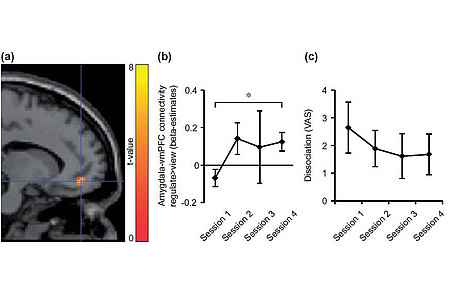Sie befinden sich hier
Inhalt
Im Zentrum der Forschung der Klinik steht die Psychopathologie Stress-assoziierter Erkrankungen (insbesondere der Borderline-Persönlichkeitsstörung und der Posttraumatischen Belastungsstörung) und daraus abgeleitete psychotherapeutische Interventionen. Unser Ziel ist ein besseres Verständnis von Pathomechanismen der Emotionsregulation und der sozialen Interaktion sowie der Einfluss von Stress auf Kognitive Prozesse.
Dabei kommen insbesondere die Methoden der Experimentellen Psychopathologie zum Einsatz, d.h. die Modellierung von Pathomechanismen im Rahmen von Verhaltensexperimenten und deren Untersuchung mit Methoden der Bildgebung, peripheren Physiologie und Neurochemie. Ein Beispiel für unsere Arbeit ist die Untersuchung des Mechanismus von selbstverletzenden Verhaltensweisen, bei denen Untersuchungen zur Schmerzverarbeitung sowie zur Emotionsregulation mit Hilfe von Gewebeverletzungen im Mittelpunkt stehen. Aus dem Verständnis dieser Pathomechanismen werden neue psychotherapeutische Interventionen entwickelt, wie z.B. das Echtzeit-MRT-gestützte Neurofeedback.
Einen weiteren Forschungsschwerpunkt stellt die Untersuchung der Wirkung von Psychotherapie mit neurobiologischen Methoden dar, z.B. indem vor und nach einer Psychotherapie die Emotionsregulation mittels funktioneller Bildgebung untersucht wird.
Nationale und internationale Verbundforschung
- Graduiertenkolleg 2350 „Impact of Adverse Childhood Experiences on Psychosocial and Somatic Conditions Across the Lifespan” (Heidelberg-Mannheim)
- BMBF-Verbundprojekt “Self-Injury: Treatment, Assessment, Recovery” (Heidelberg-Mannheim-Ulm-Landau-Karlsruhe-Rostock)
- BrainBoost- A Neurofeedback Booster for Emotion Regulation Therapy (University of Yale - Medizinische Fakultät Mannheim)
Auswahl aktueller Publikationen
- Herzog, J.I., Thome, J., Demirakca, T., Koppe, G., Ende, G., Lis, S., Rausch, S., Priebe, K., Müller-Engelmann, M., Steil, R., Bohus, M., Schmahl, C. Severity of type and timing of retrospectively reported childhood maltreatment on female amygdala and hippocampal volume. Scientific Reports (in press)
- Zaehringer, J.K., Ende, G., Santangelo, P., Kleindienst, N., Ruf, M., Bertsch, K., Bohus, M., Schmahl, C., Paret, C. Improved emotion regulation after neurofeedback: A single-arm trial in patients with borderline personality disorder. Neuroimage Clinical (in press)
- Gradinger, T., Sack M., Cardinale, V., Thiaucourt, M., Baumgärtner, U., Schmahl, C., Ende, G. (2019). The glutamate to GABA ratio in the posterior insula is associated with pain perception in healthy women but not in women with borderline personality disorder. Pain, 160, 2487-2496.
- Mancke, F., Schmitt, R., Winter, D., Niedtfeld, I., Herpertz, S.C., & Schmahl, C. (2018). Assessing the marks of change: how psychotherapy alters the brain structure in women with borderline personality disorder. Journal of Psychiatry and Neuroscience, 43, 171-181.
- Lyssenko, L.*, Schmahl, C.*, Weidner, L., Vonderlin, R., Bohus, M., & Kleindienst, N. (2018). Dissociation in psychiatric disorders – a meta-analysis of studies using the Dissociative Experience Scale. American Journal of Psychiatry, 175, 37-46. (* Both authors contributed equally)
- Paret, C., Kluetsch, R., Zaehringer, J., Ruf, M., Demirakca, T., Bohus, M., Ende, G., & Schmahl, C. (2016). Alterations of amygdala-prefrontal connectivity with real-time fMRI neurofeedback in BPD Patients. Social Cognitive and Affective Neuroscience, 11, 952-960.
- Schulze, L., Schmahl, C., & Niedtfeld, I. (2016). Neural correlates of disturbed emotion processing in borderline personality disorder: A multimodal meta-analysis. Biological Psychiatry, 79(2), 97-106.
- Ende, G., Cackowski, S., Van Eijk, J., Sack, M., Demirakca, T., Kleindienst, N., Bohus, M., Sobanski, E., Krause-Utz, A., & Schmahl, C. (2015). Impulsivity and aggression in female BPD and ADHD patients: association with ACC glutamate and GABA concentrations. Neuropsychopharmacology, 41(2):410-418.
- Reitz, S., Kluetsch, R., Niedtfeld, I., Knorz, T., Lis, S., Paret, C., Kirsch, P., Meyer-Lindenberg, A., Treede, R.D., Baumgärtner, U., Bohus, M., & Schmahl, C. (2015). Incision and stress regulation in borderline personality disorder: neurobiological mechanisms of self-injurious behaviour. British Journal of Psychiatry, 207(2), 165-172.
- Niedtfeld, I., Schulze, L., Kirsch, P., Herpertz, S.C., Bohus, M., & Schmahl, C. (2010). Affect regulation and pain in borderline personality disorder: a possible link to the understanding of self-injury. Biological Psychiatry, 68(4), 383-391.
Kontextspalte
Kontakt

Prof. Dr. Christian Schmahl
Klinik für Psychosomatik und Psychotherapeutische Medizin
Zentralinstitut für Seelische Gesundheit
Quadrat J5
68239 Mannheim
Telefon 0621 1703-4002
christian.schmahl@zi-mannheim.de

